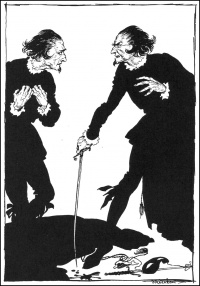Alter ego
From The Art and Popular Culture Encyclopedia
|
Related e |
|
Featured: |
An alter ego (Latin for "other self") is a second self, which is believed to be distinct from a person's normal or true original personality. A person who has an alter ego is said to lead a double life. The term appeared in common usage in the early 19th century when dissociative identity disorder was first described by psychologists. Cicero coined the term as part of his philosophical construct in 1st-century Rome, but he described it as "a second self, a trusted friend".
A distinct meaning of alter ego is found in literary analysis used when referring to fictional literature and other narrative forms, describing a key character in a story who is perceived to be intentionally representative of the work's author (or creator), by virtue of oblique similarities, in terms of psychology, behavior, speech, or thoughts, often used to convey the author's own thoughts. The term is also sometimes, but less frequently, used to designate a hypothetical "twin" or "best friend" to a character in a story. Similarly, the term alter ego may be applied to the role or persona taken on by an actor or by other types of performers.
The existence of "another self" was first recognized in the 1730s. Anton Mesmer used hypnosis to separate the alter ego. These experiments showed a behavior pattern that was distinct from the personality of the individual when he was in the waking state compared with when he was under hypnosis. Another character had developed in the altered state of consciousness but in the same body.
Alter ego is also used to refer to the different behaviors any person may display in certain situations. Related concepts include avatar, doppelgänger, impersonator, and dissociative identity disorder (DID).
In fiction
- The title characters in Robert Louis Stevenson's thriller Strange Case of Dr Jekyll and Mr Hyde represent an exploration of the concept that good and evil exist within one person, constantly at war. Edward Hyde literally represents the doctor's other self, a psychopath who is unrestrained by the conventions of civilized society, and who shares a body with the doctor. The names "Jekyll and Hyde" have since become synonymous with a split personality or an alter ego that becomes capable of overpowering the original self.
- Norman Douglas in the late 1890s wrote a short story, "The Familiar Spirit", about a man who became aware while drowning of a conformist second self – "the presence within him of this Spirit, his alter ego, which is bent on crushing his ambition".
- The movie Fight Club, the narrator, played by Edward Norton, has an alter ego he loses control of, Tyler Durden, played by Brad Pitt.
- In the 2013 film The Double by Richard Ayoade, the character of James is considered to be the alter-ego of Simon, which both characters are played by Jesse Eisenberg.
See also
- Author surrogate
- Avatar
- Dissociative identity disorder - a mental disorder in which sufferers change personality and identity.
- Doppelgänger
- Double
- Id, ego, and super-ego
- Impersonator
- Moniker (nickname)
- Mononymous person
- Pen name
- Persona
- Pseudonym
- Secret identity
- Stage name
- True self and false self


